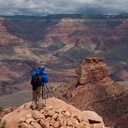5 Likes
...





Overview and HistoryTehran is the capital of Iran and the largest city in the Middle East, with a population of fifteen million people living under the peaks of the Alborz mountain range.Although archaeological evidence places human activity around Tehran back into the years 6000BC, the city was not mentioned in any writings until much later, in the thirteenth century. It's a relatively new city by Iranian standards.But Tehran was a well-known village in the ninth century. It grew rapidly when its neighboring city, Rhages, was destroyed by Mongolian raiders. Many people fled to Tehran.In the seventeenth century Tehran became home to the rulers of the Safavid Dynasty. This is the period when the wall around the city was first constructed. Tehran became the capital of Iran in 1795 and amazingly fast growth followed over the next two hundred years.The recent history of Tehran saw construction of apartment complexes and wide avenues in place of the old Persian gardens, to the detriment of the city's cultural history.The city at present is laid out in two general parts. Northern Tehran is more cosmopolitan and expensive, southern Tehran is cheaper and gets the name "downtown."Getting ThereMehrabad airport is the original one which is currently in the process of being replaced by Imam Khomeini International Airport. The new one is farther away from the city but it now receives all the international traffic, so allow an extra hour to get there or back.TransportationTehran driving can be a wild free-for-all like some South American cities, so get ready for shared taxis, confusing bus routes and a brand new shiny metro system to make it all better. To be fair, there is a great highway system here.The metro has four lines, tickets cost 2000IR, and they have segregated cars. The women-only carriages are the last two at the end, FYI.Taxis come in two flavors, shared and private. Private taxis are more expensive but easier to manage for the visiting traveler. Tehran has a mean rush hour starting at seven AM and lasting until 8PM in its evening version. Solution? Motorcycle taxis! They cut through the traffic and any spare nerves you might have left.People and CultureMore than sixty percent of Tehranis were born outside of the city, making it as ethnically and linguistically diverse as the country itself. Tehran is the most secular and liberal city in Iran and as such it attracts students from all over the country.Things to do, RecommendationsTake the metro to the Tehran Bazaar at the stop "Panzda Gordad". There you can find anything and everything -- shoes, clothes, food, gold, machines and more. Just for the sight of it alone you should take a trip there.If you like being outside, go to Darband and drink tea in a traditional setting. Tehranis love a good picnic and there are plenty of parks to enjoy. Try Mellat park on a friday (fridays are public holidays), or maybe Park Daneshjou, Saaii or Jamshidieh.Remember to go upstairs and have a look around, always always always! The Azadi Tower should fit the bill; it was constructed to commemorate the 2500th anniversary of the Persian Empire.Tehran is also full of museums such as:the Contemporary Art Museumthe Abghine Musuem (glass works)the 19th century Golestan Royal Palace museumthe museum of carpets (!!!)Reza Abbasi Museum of extraordinary miniaturesand most stunning of all,the Crown Jewels Museum which holds the largest pink diamond in the world and many other jaw-dropping jewels.Text by Steve Smith.